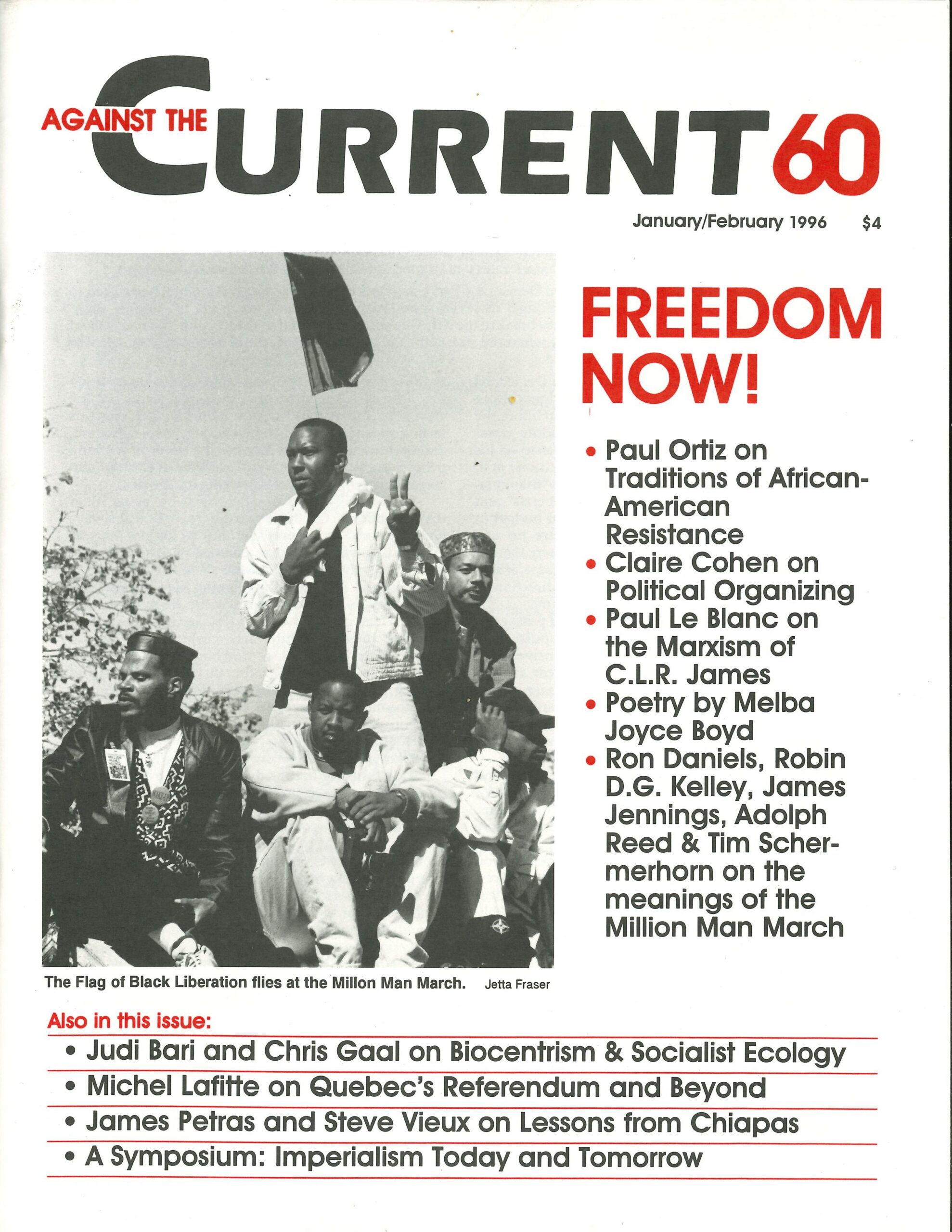Against the Current, No. 60, January/February 1996
-
Budget Wrestlemania
— The Editors -
Labor's Wars
— The Editors -
Quebec After the Referendum
— Michel Lafitte -
Lessons of the Chiapas Uprising
— James Petras and Steve Vieux -
Radical Rhythms: Andrew Hill's Blue Note Sessions
— W. Kim Heron -
Rebel Girl: Booksellers--Endangered Species?
— Catherine Sameh -
Random Shots: Notes for the Holidays
— R.F. Kampfer - A Symposium on Imperialism Today
-
Introduction
— The Editors -
Whither Capitalist Militarism?
— Ellen Meiksins Wood -
The Not-So-New Imperialism
— Harry Magdoff -
Defining Imperialsim Today
— Mel Rothenberg -
The Politics of Anti-Intervention
— Darrel Moellendorf - African-American History and Politics
-
Forging Our Political Agenda
— interview with Claire Cohen -
Letter to Che
— Melba Joyce Boyd -
A Word of Introduction
— The Editors -
An Historic Turning Point?
— an interview with Ron Daniels -
Going Beyond Self-Help
— Robin D.G. Kelley -
An Affirmation of Humanity
— James Jennings -
Victim Blaming and Patriarchy
— Adolph Reed -
Potential and Contradiction
— Tim Schermerhorn -
African-American Resistance to Jim Crow in the South
— Paul Ortiz -
The Marxism of C.L.R. James
— Paul Le Blanc - Perspectives on Environmental Struggle
-
Two Perspectives
— The Editors -
Biocentrism and Revolutionary Ecology
— Judi Bari -
Toward Ecological Socialism
— Chris Gaal - Reviews
-
Noam Chomsky: Classic Libertarian
— Peter Stone -
Beyond Liberal Multiculturalism
— Tim Libretti - In Memoriam
-
Witold Jedlicki, 1929-1995
— Samuel Farber -
The Unrelenting Genora Dollinger
— Sol Dollinger
Harry Magdoff
A. I DON’T THINK that there has been a significant change in the role of the IMF and World Bank. From their inception, at the time the Second World War was winding down, to this day, their main function has not varied. Their job has been, and continues to be, the strengthening and enlargement of the imperialist network of trade and investment.
There have been three key components to this strategy. The first was to reconstruct and stabilize the international financial system which had been wrecked by the Great Depression and the war. The second was to tie the colonial, and subsequently decolonized, nations firmly to the economies of the great powers, and thereby widen investment opportunities and enlarge markets in the periphery. The third was to sabotage the efforts of those nations that wanted to break out of the imperialist network by shifting to policies of self-reliance and/or developing close relations with noncapitalist countries.
The increasing level of activity of these agencies in recent years reflects not a new role but the spread of a general crisis in the last quarter century. As the so-called golden years of the `50s and `60s turned into a long-run stagnation, these agencies intervened more often because breakdowns in the periphery threatened the stability of financial institutions and markets of the leading capitalist powers.
In addition, these agencies have become more brazen and open in imposing conditions for granting loans. Before the 1970s these conditions were by and large kept secret as long as possible. They became overt when the axe fell on the masses, who were expected to pay directly and indirectly the debt service charges to the international banks.
The more recent openness in disclosing the conditions imposed by the IMF and the World Bank no doubt reflects the increasing hegemony of bourgeois ideology, according to which removal of subsidies that give some protection to the poor, so-called free markets and free international trade, privatization and unrestricted foreign investment are supposed to be the principal ways to obtain economic recovery and growth.
Increasing intervention by the IMF and the World Bank? Yes, but it is intervention for the sake of capital and its financial markets. Why put the finger on the servants instead of the masters? There has been no significant change in the thrust by the imperial powers to control and influence the periphery. What is new is the inability of capital to creep out of the morass of a long-lasting stagnation, accompanied by increasing fragility of its financial institutions. In such times, the squeeze on the weaker nations is bound to get tougher.
B. It is not good to be sectarian. Imperialism, however, is evil incarnate. And evil is something one should not equivocate about. Why does the question about opposing imperialism in a nonsectarian manner even arise?
No doubt because it is customary in polite circles to deny the existence of imperialism. Professors, journalists and government officials use euphemisms and weave fancy theories to disguise what is going on. But it is for that very reason that the fight against imperialism must start by calling a spade a spade. Our tasks should be to educate about the imperialism as part of the history of monopoly capital, and to expose the manifold ways of imperialism today.
There are of course many campaigns against specific outcroppings of imperialism that need to be conducted, such as lifting the embargo on Cuba and stopping aggression against national liberation movements. But it is foolhardy to imagine that the left can somehow become relevant and nonsectarian by advocating policies which will outwit or make an end run around the imperialist system. Imperialism is in the belly of monopoly capital. A meaningful opposition to imperialism should never forget that truth.
C. I believe that debates about “humanitarian intervention” by U.S. forces are futile. On foreign affairs, the best thing the United States can do for humanity is to get out of the rest of the world lock, stock and barrel.
ATC 60, January-February 1996

